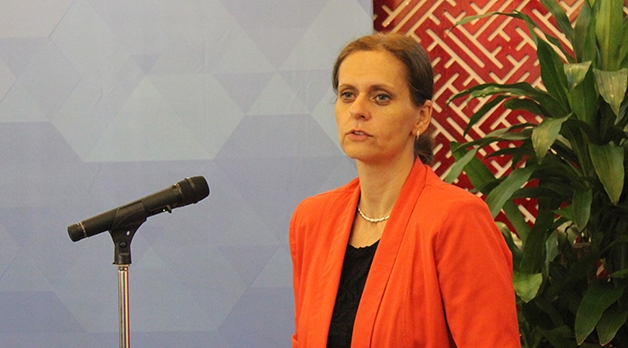.jfif) Opinion
Opinion

The severe drought and saltwater intrusion in Việt Nam’s South Central, Central Highlands and Mekong Delta regions showed the importance of protecting water resources. Ambassador of Israel to Việt Nam, H.E Ms. Meirav Eilon Shahar shared her countries experiences this field.
 |
The severe drought and saltwater intrusion in Việt Nam’s South Central, Central Highlands and Mekong Delta regions showed the importance of protecting water resources. Ambassador of Israel to Việt Nam, HE Ms Meirav Eilon Shahar shared her countries experiences in this field.
The Water Sector of the State of Israel has experienced, in recent years, significant changes in almost all of its aspects: physical, structural, legislative and organisational. During the last decade the decision makers in Israel came to understand that the only possible way to cope, on one hand, with the natural water shortage, and on the other, with growing population and life quality standards, is to adopt and implement as national policy the Integrated Water Resources Management approach.
The ongoing struggle with almost constant water shortages gave birth to different new directions for the required measures that have been gradually developed based on economical, organisational and environmental abilities of the market.
At first an extremely high efficiency was reached in the agricultural production per water unit. In parallel, combining regulations with educational and media campaign we succeeded to reduce domestic consumption by almost 20 per cent.
Supported by more than US$500 million of governmental investments, a nationwide infrastructure of treated effluents plants was developed. Together with proper regulatory conditions this unprecedented step allowed us to reuse 86 per cent of treated sewage for irrigation and, due to increased availability and affordability – to sustain and develop a wide spectrum of agricultural fields.
Together with all these stages, different agricultural crops were adjusted to irrigation with brackish or marginal water in total annual volume of hundreds of millions cubic meters.
Only after the full use of all the cheap and environmentally friendly measures, Israel commenced with the implementation of a large scale seawater desalination programme. Up-to-date the total production capacity of the seawater desalination plants that were built reached about 50 per cent of all our water needs.
The establishment of a wide range of different water resources enabled the Israel Water Authority, as mentioned, to activate the IWRM model that takes into consideration the state of the art condition of the natural water resources, economic and environmental aspects, while preserving natural resources.
As for now, we have a Master Plan for operation of the water sector up to 2050. This program maximises the efficiency, conservation and wastewater reuse for agricultural needs, together with development of the required seawater desalination infrastructures in order to complete future expected consumption.
But as our experience showed, it is better to exploit human abilities first: saving, efficiency and reuse; and only after and if required – turning to expensive seawater desalination.
The Water Authority of Israel is in charge of management and regulation of the Water Sector in Israel, by implementation of the Water Law in all of its aspects.
We give an utmost importance to the basic axiom in our region – the natural water resources are stressed, and the continuous water crisis is a fact of life. The key for coping with this challenge on a sustainable basis lies in the Integrated Water Resources Management. As Israel altered its difficulties to advantages, we truly hope that our experience can suggest a toolkit for other countries.
The Basket of Available Israeli Technologies for Efficiency in the Water Sector: methods and technologies for economic irrigation in agriculture, automation and irrigation control in private and public gardening; methods for localisation of leakage in the underground pipelines, for pressure control and wise management of the urban water systems; technologies related to water security and management of the water sector in times of crisis; technologies for efficient water use in the domestic sector; technologies for efficient water use and reuse in industrial sector; usage of "grey" water – local exploitation and purification, under directives of the Ministry of Health; wastewater treatment – wide range of economically, environmentally and energy efficient technologies; and economically and energy efficient desalination methods, including the contracts structure of the Public Private Partnership based on BOO and BOT principles./.